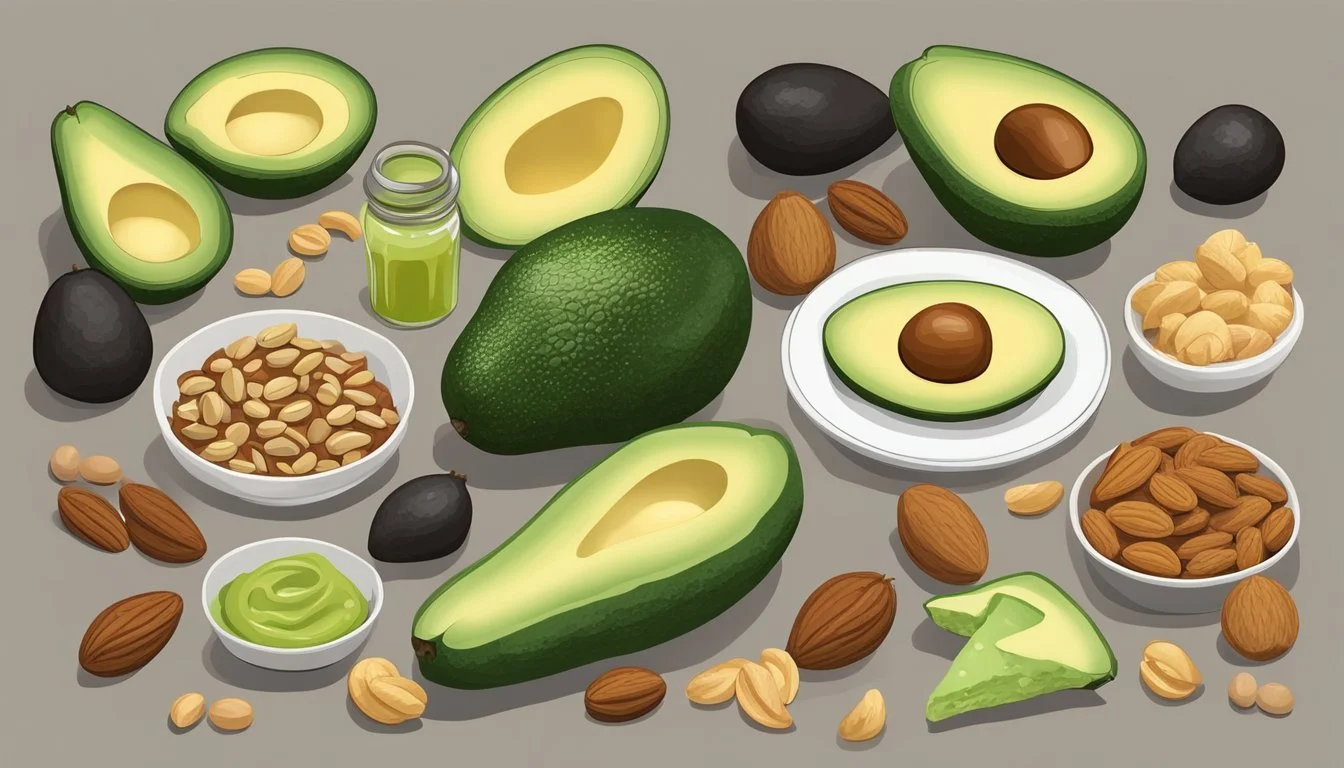How a High-Fat Diet Can Boost Metabolic Efficiency
Unveiling Nutritional Science
A high-fat diet, contrary to traditional dietary advice, may have the potential to boost metabolism, altering how the body processes energy. When the body consumes fats, it must adapt its energy extraction processes, which can lead to an increase in metabolic rate. Metabolic rate is the amount of energy the body expends at rest, and enhancing it could lead to improvements in energy management and expenditure.
The premise of utilizing a high-fat diet to improve metabolism is founded on the concept of nutritional ketosis. In this state, the body shifts from relying primarily on carbohydrates for energy to burning fats as its main fuel source. This transition not only affects energy usage but may also lead to a more efficient metabolic process. It is essential to differentiate between different types of fats, as some are more beneficial than others in terms of metabolic health.
It's important to note that any dietary approach, including high-fat diets, should be tailored to an individual's specific health needs and conducted under proper nutrition guidance. A high-fat diet may not be appropriate for everyone, and its impact on metabolism can vary based on overall dietary composition, individual health status, and lifestyle factors. Therefore, while it may offer metabolic advantages to some, it should be considered within the larger context of balanced nutrition and personal well-being.
Understanding Metabolism
The metabolism encompasses the processes by which the body converts food into energy for use in cellular and physiological functions. Dietary choices, particularly the composition of macronutrients, can significantly influence one's metabolic rate.
Basics of Metabolic Processes
Metabolism involves a complex network of hormones and enzymes that help convert food into energy. This energy is measured in calories and is essential for the body to sustain basic functions, known as the resting energy expenditure (REE). Every person's metabolism is unique, influenced by factors such as age, sex, muscle mass, and genetic disposition.
Impact of Diet on Metabolic Rate
Diet plays a crucial role in determining energy metabolism. The caloric balance equation determines whether an individual will gain, lose, or maintain weight. If one consumes more calories than their body needs, weight gain typically ensues; if caloric intake is less than what the body expends, weight loss usually occurs.
Role of Fat in Metabolism
Dietary fat is a key player in metabolism, serving both as a dense energy source and as a necessary component for various bodily functions. High-fat diets can alter one's energy metabolism by changing how the body uses and stores energy, potentially increasing the resting energy expenditure. Fat can also impact the release of hormones that regulate satiety and hunger, affecting overall caloric intake.
Dietary Fats and Their Types
Dietary fats are crucial for energy, cell growth, and hormone production. The body requires a balanced intake of different fats to function optimally and maintain metabolic health.
Saturated vs Unsaturated Fats
Saturated fats are typically solid at room temperature and are found in animal products like meat and dairy, as well as in some tropical oils. Consuming too much saturated fat can increase cholesterol levels, which may lead to heart disease. In contrast, unsaturated fats are usually liquid at room temperature and are derived from plants and fish. These fats are further divided into monounsaturated and polyunsaturated fats. Monounsaturated fats, found in olive oil and avocados, for example, can help reduce bad cholesterol levels and improve heart health. Polyunsaturated fats, which include omega-3 and omega-6 fatty acids, are essential for body functions and are found in foods like salmon and sunflower oil.
Trans Fats and Health Implications
Trans fats are created through an industrial process that adds hydrogen to vegetable oil, which causes the oil to become solid at room temperature. This process is used to create partially hydrogenated oils. Trans fats can increase the risk of heart disease by raising bad cholesterol levels (LDL) and lowering good cholesterol levels (HDL). Due to their detrimental health implications, many food manufacturers have reduced or eliminated trans fats from their products.
Importance of Omega-3 Fatty Acids
Omega-3 fatty acids are a type of polyunsaturated fat that are especially beneficial for heart health. These fats can help decrease the risk of coronary artery disease, lower blood pressure, and reduce inflammation throughout the body. Rich sources of omega-3s include fish—such as salmon, mackerel, and sardines—flaxseeds, and walnuts. Incorporating omega-3 fatty acids into one's diet is an important component of a metabolism-boosting high-fat diet.
The High-Fat Diet Explained
A high-fat diet centers around consuming higher amounts of dietary fats and fewer carbohydrates to induce metabolic changes for weight management. Its effectiveness is rooted in the metabolic state known as ketosis, contrasting with traditional low-fat approaches.
Ketogenesis and Ketones
Ketogenesis is a metabolic process where the liver breaks down fatty acids into compounds called ketones. A high-fat diet promotes this process, providing most of the body's energy needs through ketones instead of glucose, leading to metabolic efficiency and the potential to burn more calories. Individuals on such a diet switch their primary energy source from carbohydrates to lipids.
The Role of a High-Fat Diet in Weight Management
The strategic increase in dietary fats can lead to a feeling of satiety, reducing overall calorie intake and possibly contributing to weight loss. A high-fat diet could also stabilize blood sugar levels, helping in weight management and reducing risks associated with obesity. It's critical to distinguish between healthy fats and trans fats – the former being beneficial for weight control.
Comparison with Low-Fat Diets
A comparison between high-fat and low-fat diets shows divergent approaches in energy sourcing. While low-fat or fat-free diets focus on reducing fat intake and often increase carbohydrates, a high-fat diet reduces carbs and relies mainly on fats for energy. It challenges the traditional paradigm of low-fat diets by suggesting that fats can be advantageous for those struggling to manage their weight.
Nutritional Components of a High-Fat Diet
A high-fat diet is rich in proteins, fats, and essential micronutrients. It carefully limits carbohydrates while ensuring adequate intake of fiber, vitamins, and minerals.
Proteins and Amino Acids
Proteins, comprised of amino acids, are vital for building and repairing tissues and maintaining muscle mass on a high-fat diet. Such diets typically include animal proteins—meat, poultry, fish, and eggs—which are complete proteins containing all the essential amino acids. Plant-based proteins like nuts and certain seeds can also contribute to protein intake, though they may be less complete in their amino acid profile.
Carbohydrates and Fiber
Carbohydrates are limited on a high-fat diet, but the focus is on high-quality sources, such as non-starchy vegetables that are low in calories and high in fiber. Fiber aids in digestion and can contribute to overall metabolic health. Foods with high-fiber content include leafy greens, broccoli, and Brussels sprouts. They provide carbohydrates that have minimal impact on blood sugar levels.
Vitamins and Minerals
High-fat diets prioritize foods rich in vitamins and minerals to support body functions. Foods like fatty fish and eggs contain vitamin D and B vitamins, while nuts and seeds offer vitamin E and minerals like magnesium and zinc. It's important for the body to balance these micronutrients for optimal health while managing cholesterol intake through the selection of beneficial fats.
Health Benefits of a High-Fat Diet
High-fat diets have been scrutinized and praised for various potential health benefits. Key areas where such diets may have positive impacts include improving metabolic health, reducing risks associated with cardiovascular diseases, and bolstering cognitive functions.
Metabolic Health and Insulin Sensitivity
A high-fat diet, particularly one that is low in carbohydrates, can lead to improvements in metabolic health. It often results in lowered insulin resistance, which is a significant factor in the development of type 2 diabetes. By decreasing the body's insulin resistance, high-fat diets can help stabilize blood sugar levels and improve metabolism.
Cardiovascular Health
Although it seems counterintuitive, high-fat diets have been linked to better cardiovascular health in some cases. Diets rich in healthy fats have been found to increase levels of HDL cholesterol (the "good" cholesterol), which is known to help reduce the risk of heart disease. It's important to differentiate between healthy fats, like those from avocados and nuts, and harmful trans fats, which can increase cardiovascular risks.
Cognitive and Neurological Advantages
Fats, especially those with a high content of omega-3 fatty acids, are essential for maintaining cognitive function. Research also links high-fat diets with potential benefits for neurological health. By providing a steady source of energy for the brain, these diets may support neurological resilience and cognitive performance, particularly under conditions that challenge brain energy metabolism such as aging.
Integrating Exercise with a High-Fat Diet
A high-fat diet, when paired with a structured exercise regimen, could potentially lead to improved metabolic health. Exercise can magnify the benefits of a high-fat diet by enhancing fat oxidation and supporting muscle metabolism.
Synergy of High-Fat Diet and Physical Activity
One crucial aspect of combining a high-fat diet with physical activity is the enhanced utilization of fats for energy. Studies have shown that while high-fat diets increase the availability of fatty acids, incorporating exercise can prompt muscles to preferentially burn this fat. Therefore, when someone engages in regular physical activity, they might improve their body's ability to utilize dietary fat for energy, contributing to better overall metabolic health.
Strength Training and Muscle Metabolism
Strength training is pivotal when integrating exercise with a high-fat diet as it encourages the growth of lean muscle mass. This form of exercise stimulates the muscles to adapt by increasing their capacity for fueling workouts with fats, thus optimizing muscle metabolism. Additionally, strength training can:
Increase muscle mass, which naturally burns more calories at rest.
Improve insulin sensitivity, allowing the body to process nutrients more effectively.
Cardiovascular Exercises and Fat Utilization
Similarly, cardiovascular exercises play a significant role in enhancing fat metabolism within a high-fat diet framework. Regular aerobic activity, such as running or cycling, increases the heart rate and, consequently, the body's demand for energy. As a result, the body more readily taps into stored fat reserves, promoting fat utilization and helping to:
Reduce the risk of cardiovascular disease.
Improve endurance and cardiovascular efficiency.
Incorporating a balance of strength training and cardiovascular exercise can provide comprehensive benefits to those following a high-fat diet, leading to a healthier metabolic profile and a lower risk of metabolic and cardiovascular conditions.
Addressing Common Myths about Fat Consumption
In discussing the role of fats in metabolism, it is imperative to dispel prevalent misconceptions. The focus will be on three key areas: how fats integrate with calorie counting, their actual impact on heart disease, and their relation to weight gain.
The Calorie Counting Myth
One prevalent myth is that all calories are equal and that fat consumption should be minimized because fats are more calorie-dense. However, not all calories have the same effect on energy expenditure and metabolism. Fats can induce a feeling of fullness, leading to less overall calorie consumption. Additionally, certain fats increase the amount of energy used for digestion, absorption, and metabolizing food, thus potentially boosting metabolic rate.
Fats Leading to Heart Disease
Another common but outdated belief ties fat intake directly to heart disease, particularly regarding saturated fats. Recent evidence suggests that not all saturated fats are detrimental, and their intake does not always correlate with heart disease risk. Replacing saturated fats with monounsaturated fats or polyunsaturated fats, like those from nuts and olive oil, may lower the risk of heart disease by favorably altering blood lipid profiles.
Fat Storage and Weight Gain
The prevailing notion that dietary fat converts directly into body fat is simplistic and does not consider the complexity of human metabolism. Fats are essential for numerous body functions and do not necessarily cause obesity. The balance between calorie intake and energy expenditure is what ultimately influences weight management. Moderate fat consumption, when integrated within a well-balanced diet, may support metabolic health and does not directly translate into increased fat storage.
High-Fat Foods and Smart Choices
Adopting a diet rich in healthy fats can enhance one's metabolism, but it is crucial to make informed choices about the types and sources of fats consumed.
Choosing Healthy Fats over Processed Ones
Individuals should prioritize monounsaturated and polyunsaturated fats over trans and saturated fats often found in processed foods. Olive oil and avocado are exemplary sources of healthy fats. These unprocessed fats provide energy, support cell function, and help in the absorption of vitamins.
Incorporating Nuts, Seeds, and Dairy
Nuts such as almonds, walnuts, and pistachios, along with seeds like chia and flaxseeds, are rich in essential fatty acids and also deliver dietary fiber and protein. When choosing dairy, one should consider products like full-fat yogurt that contain natural fats and can offer probiotic benefits.
Healthy Nuts & Seeds:
Almonds
Walnuts
Chia Seeds
Flaxseeds
Role of Fish and Seafood in a High-Fat Diet
Fish and seafood play a pivotal role due to their high omega-3 fatty acid content, which is vital for heart health and cognitive function. Fatty fish like salmon and mackerel are particularly beneficial and should be a regular part of a high-fat diet.
Omega-3-rich Fish:
Salmon
Mackerel
Sardines
Choosing these foods supports a balanced diet focused on healthy eating while providing the metabolic benefits associated with high-fat diets.
Influence of Lifestyle and Environmental Factors
While exploring the potential metabolic benefits of a high-fat diet, it is crucial to consider the interplay between lifestyle choices, environmental influences, and biological factors. These determinants can significantly modulate how the body processes fats and utilizes energy.
Sleep and Stress
Sleep plays a pivotal role in metabolic health. Inadequate sleep has been linked to impaired glucose metabolism and increased food intake, which can counteract the benefits of a high-fat diet. In contrast, sufficient sleep can enhance metabolic rate and fat oxidation. Additionally, stress impacts hormonal balances, such as cortisol levels, which can influence fat storage and metabolism. A high-fat diet might be more effective when an individual maintains good sleep quality and manages stress appropriately.
Age and Metabolic Changes
As individuals age, they typically experience a natural slowdown in their metabolism. This can affect the body’s ability to efficiently use dietary fats. It is important for older adults to adapt their dietary choices, including the intake of fats, to their changing metabolic rate to maintain energy balance and health.
Genetics and Personalized Nutrition
Genetics play a defining role in how an individual's metabolism responds to different types of diets, including those high in fat. Genetic variations can affect the digestion, absorption, and utilization of fats. Personalized nutrition, which tailors dietary recommendations based on genetic makeup, may optimize the metabolic advantages of a high-fat diet. Understanding one's genetic predispositions can guide the selection of dietary fats to improve metabolism and overall health.
Constructing a Balanced High-Fat Meal Plan
When constructing a high-fat meal plan, one must find a balance between sufficient healthy fats, proteins, and carbohydrates while maintaining overall nutritional balance. It's essential to focus on fats beneficial to heart health and metabolic function, such as monounsaturated and polyunsaturated fats.
Daily Meal Planning Tips
Diversify Fat Sources: Include a variety of healthy fats like avocado, nuts, seeds, and olive oil to ensure a range of beneficial fatty acids.
Control Portions: Even when consuming healthy fats, it's important to be mindful of portion sizes to avoid excessive calorie intake.
Integrate Fiber: Pairing high-fat foods with fiber-rich vegetables and fruits can help maintain digestive health and blood sugar levels.
Recipes and Meal Ideas
For breakfast, consider an omelet with spinach and feta cheese, using an olive oil drizzle. Lunch could comprise of a mixed greens salad topped with grilled salmon, avocado, and a handful of walnuts.
Dinner ideas include a stir-fry with lean cuts of beef, plenty of colorful vegetables, and a side of quinoa cooked in bone broth for additional nutrients.
Snacks: Almonds, cheese sticks, and full-fat Greek yogurt are convenient options.
Supplementation and Adequate Hydration
Fish oil or algae supplements can be beneficial for those not getting enough omega-3 fatty acids from their diet.
Magnesium and vitamin D are common supplement considerations to support metabolic health.
Drink plenty of water: around 8 glasses daily or more, depending on activity levels and individual needs, to support metabolism and overall health.
The Role of Healthcare Professionals
Healthcare professionals play a crucial role in guiding individuals through the complexities of a high-fat diet to ensure metabolic health is maintained.
Consulting a Registered Dietitian
A Registered Dietitian (RD) is pivotal for personalizing high-fat dietary plans. They assess individual health needs and preferences, then tailor meal plans to support metabolism and overall well-being. This specialist also educates on maintaining a balanced intake of macronutrients—proteins, fats, and carbohydrates—to foster metabolic efficiency.
Diet Planning
Personalized nutrition assessment
Tailored high-fat meal planning
Macronutrient balance
Following Medical Guidelines and Recommendations
It is imperative for individuals to adhere to medical guidelines and recommendations, such as those proposed by the American Heart Association (AHA). These guidelines are grounded in scientific research and aim to optimize heart health and metabolic function, even when following dietary trends like high-fat diets.
Adherence to Guidelines
Scientifically researched
Prioritizing heart health
Metabolic function optimization







